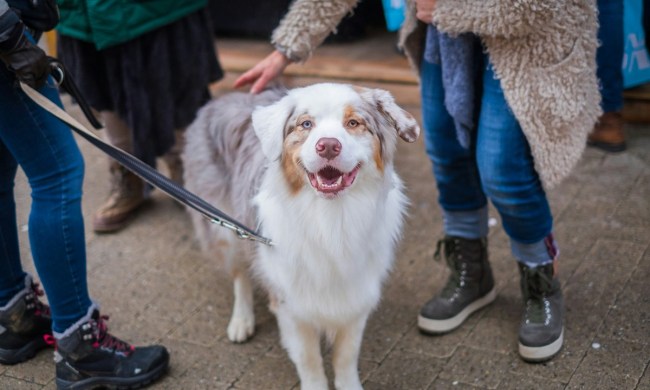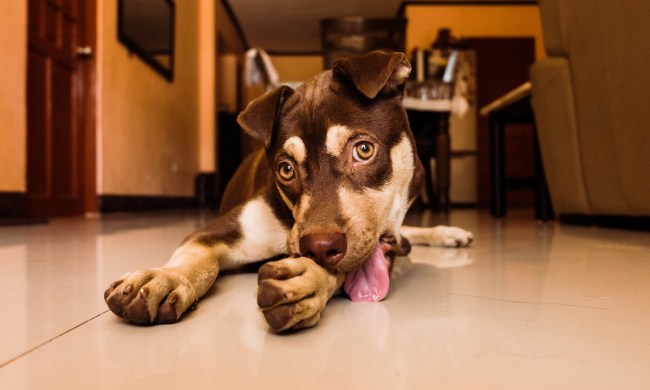Dogs love to lick — the floor, their human’s face, and of course, each other. It can be kind of sweet to see your pup giving his best furry friend a bath, though you may also start to wonder if they lick too much. Specifically, you might ask yourself, “Why does my dog lick my other dog’s ears?” It’s a conundrum that has likely baffled pet owners throughout the ages and probably goes back just as far. We’ll walk you through why dogs seem to have a penchant for licking this body part.
Why does my dog lick my other dog’s ears?

As we have established, this ancient instinct has been passed down for thousands of years, at least. Even in the wild, wolves lick other members of the pack. In your home, the pack includes you and other dogs, or even cats, which occupy the household. Licking represents one small piece of overall communication that includes barking and more obvious body language, such as tail wagging. While we dive into the various causes, do take licking as a sign of affection, whether directed at you or the other pooches in the house.
That’s because moms have to lick their puppies, beginning at birth, to help with bodily functions (the polite way of saying peeing and pooing) and to keep the dog babies clean. In adulthood, they still lick each other sometimes for these reasons (the grooming part) but also to establish pack hierarchy, with the most submissive animal in charge of licking while the dominant one takes on the role of lickee.
To determine if the pecking order is at play, look for other signs that one dog is in charge. You might find the submissive four-legger go up to their friend, mouth open, and then roll over to show their belly — a clear indication that they respect the alpha. However, not all licking stems from a need to maintain the canine social structure.
Grooming
It makes sense that mama pups would lick their little ones and that sometimes adult dogs need a little help cleaning themselves, too. Usually when we think of grooming, we imagine a dog tongue cleaning their own fur, but what about the parts that they can’t reach? It helps when your buddies give each other a paw (or mouth) in this area.
Snacking
Yes, it’s gross. There’s a good chance your little canines enjoy the taste of ears, especially ear wax, because it’s a bit salty. That could explain why your pup pup continues licking long after the area is surely clean. Unfortunately, too much licking can cause problems, so don’t allow this to go on for very long.
Soothing
Sometimes, excessive licking has more to do with feelings than anything physical. Dogs often engage in this behavior when anxious, and it can indicate that you need to work on the cause of their stress. But it might also be their way of settling down for the day.
When should you be concerned?

A little ear licking doesn’t mean anything and you would do best to just let them at it. But too much can be a cause or a result of an ear infection. That’s right; when your beastie smells something off about their buddy, they might lick the area, thinking that helps. You’ll know that a medical problem is at play when you notice a sharp uptick in licking sessions.
Occasionally, ear problems come from mites which you may spot on their ear canal as well (though the mites themselves are too small to see, you can find residue from them). Talk to your dog’s vet when you think there could be a bigger issue to solve.
How can I stop excessive licking?

If your vet determines that the licking needs to end, you’ll have to take a few steps to convince your fur baby to give up their habit.
Distraction
Our first bit of advice is to try a fun toy with an interactive component. This might be one that squeaks or engages your pooch in other ways. Try to get in front of the licking since you don’t want them to associate it with playtime.
Training
You should train your furball no matter what, but it can play an important part in curbing unwanted behaviors. If they already have the basics down, use your redirection to get them to give up the kisses. That might mean telling them to go to his bed, for example, which could force them to stop licking your other animal.
Treats
You need to ensure that you don’t reward licking behavior with a treat, so get them to stop first and then provide a snack more enticing than ear wax. Some dogs love lick mats or treat toys, which keep their mouth otherwise occupied.
It seems bizarre to us, but somehow our dogs understand licking behavior and all that goes with it. The next time you spot Fido cleaning their best friend’s ear, don’t worry too much, but do keep an eye out for excessive tonguing.




